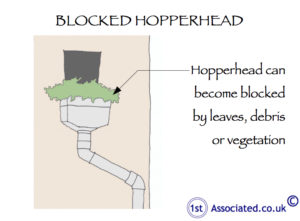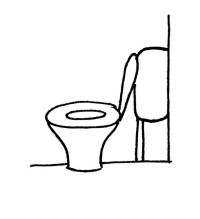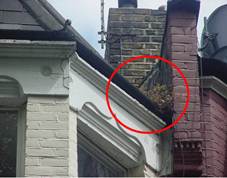Approved Inspectors -v- Local Authority Building Control Officers, which are best?
We are Independent Surveyors, free phone us for help and advice
 We can offer you help and advice with regard to extending your property and many other property matters. We carry out full structural surveys, property reports, dilapidations reports, commercial building surveys, specific defects reports and boundary surveys.
We can offer you help and advice with regard to extending your property and many other property matters. We carry out full structural surveys, property reports, dilapidations reports, commercial building surveys, specific defects reports and boundary surveys.
We use lots of sketches (like this one of a blocked hopperhead) and photos in our building surveys to give our clients a better understanding.
We also write many articles like this one, Approved Inspectors vs Local Authority Building Control Officers.
Please Free Phone us on 0800 298 5424 for a friendly chat with one of our surveyors.
How do I book a survey?
It's easy either:-
Free phone 0800 298 5424
or fill in our no obligation Quick Quote form
Both from the same backgrounds

Typically, building control officers will have had a degree level training in a related discipline, such as a degree in building or a degree in building surveying. They will have then mixed this academic knowledge with experience and would then have, possibly, become members of either the Association of Building Engineers or The Royal Institution of Chartered Surveyors. It is likely that they have gained their experience within a local authority, as they generally have a good training system in place, although commercial property companies are becoming more aware of the need to have graduate training schemes. We should add that there will be many good tradesmen that have worked their way up within building control departments.
The arrival of approved inspectors
As a general move to de-regulate and de-monopolise (some would say unclog block ups and slowness in the system) approved inspectors arrived, who work in a similar/same manner to the local authority, approving to the latest Building Regulations.
What is the difference between an approved inspector and a local authority building control officer?
 In theory, the standard of the work they carry out should be to the same standard, the difference is more with regard to distance. A local authority building control officer, as the name suggests, will work within a local authority area, perhaps covering a small part of that area and specialising in property type, such as residential. This means they will get excellent local knowledge and get to know local builders working in the area. It may mean their spectrum of work that they look at is limited, but this depends upon the area and the building and property development activity in that area.
In theory, the standard of the work they carry out should be to the same standard, the difference is more with regard to distance. A local authority building control officer, as the name suggests, will work within a local authority area, perhaps covering a small part of that area and specialising in property type, such as residential. This means they will get excellent local knowledge and get to know local builders working in the area. It may mean their spectrum of work that they look at is limited, but this depends upon the area and the building and property development activity in that area.
An approved inspector tends to be dealing with a client on a national basis, looking to roll out perhaps a chain of similar stores or shopping centre fit outs, and they will get to know and understand what the client wants. It can be argued that this relationship is sometimes too close. Equally, it can be argued that they, being the company and the approved inspector, get to know each other and, depending upon the relationship of course, the best solution is agreed on a national basis.
This would be as opposed to, in area of the country that they want to open their store/shop, having to get individual approval, as they would have a type approval. Having said that, we are advised that some local authorities act as a lead authority and also look at type approval. Either way, the introduction of competition is not, we don't think, a bad thing.
Approved inspectors -v- local authority building control officers; an example
 We have recently come across a case where a landlord within a shopping centre was renting out some units of 1200 square feet, approximately 120 square metres. They had an agreement that, as required under the Building Regulations, they would have toilet facilities and the usual staffroom that's also a store room! The toilet facilities, however, had to be suitable for use by any disabled members of staff, which under the current Building Regulations required 2.2 metres by 2 metres as a minimum size, plus lobby space as you don't want the toilet door facing onto your selling area.
We have recently come across a case where a landlord within a shopping centre was renting out some units of 1200 square feet, approximately 120 square metres. They had an agreement that, as required under the Building Regulations, they would have toilet facilities and the usual staffroom that's also a store room! The toilet facilities, however, had to be suitable for use by any disabled members of staff, which under the current Building Regulations required 2.2 metres by 2 metres as a minimum size, plus lobby space as you don't want the toilet door facing onto your selling area.
This obviously affects the extent of the floor area available to sell merchandise from. This is of key importance to any retailer, of course as these toilets are for any disabled people they would need to be on the ground floor and this is the prime selling area. However, with the right sort of negotiation using an approved inspector, i.e. a private building control officer, this was negotiated to 1.5 metres plus lobby space, so a reduction in space required.
 Similarly, there was said to be a need for tea making facilities for any disabled member of staff on the ground floor. This would require a sink and a small shelf. However, after much discussion with the approved inspector it was agreed that the tea making facilities that were upstairs within the staffroom/store room area could be used and a cup of tea brought down to the disabled member of staff. It is not to say that this wouldn't be agreed with a local building control officer, it is just that when it is agreed with an approved inspector then it can be utilised in appropriate situations nationwide
Similarly, there was said to be a need for tea making facilities for any disabled member of staff on the ground floor. This would require a sink and a small shelf. However, after much discussion with the approved inspector it was agreed that the tea making facilities that were upstairs within the staffroom/store room area could be used and a cup of tea brought down to the disabled member of staff. It is not to say that this wouldn't be agreed with a local building control officer, it is just that when it is agreed with an approved inspector then it can be utilised in appropriate situations nationwide
Other articles that may be of interest to you:
It is important to remember where builders come from
Cowboy Builders and Cowboy Clients! How to get on with your Builder
Estimating Building Costs
Definitions of Building terms
Loft Conversions
What is my Home Worth?
Basement Conversions - do they add value?
Adding Value to Your Property
Why have one of our independent building surveys?
We always recommend you have an building survey on both residential and commercial property as this will highlight any property problems. Caveat emptor means buyer beware and is why you need to have a building survey to find out if there are any problems within the property. The estate agent certainly will not advise you of any but we most definitely will!
Remember the Building Surveyor that you employ will be the only person working for you with your interests at heart.
We have developed our surveys over many years, in fact several decades. We have listened to feedback from our clients and amended and altered our surveys to make them easy to read and describe issues clearly. The key factor we believe is that our surveys are easy to understand in plain English.
What do the circles and ovals mean?

The circles and ovals we use in our building surveys on our photos and sketches are there to highlight property problem areas so you are not left wondering what the property problem is like this photo showing plants growing out of a valley gutter.
Surveying article
We hope you found the article of use and if you have any experiences that you feel should be added to this article that would benefit others, or you feel that some of the information that we have included is wrong then please do not hesitate to contact us (we are only human).
The contents of the website are for general information only and are not intended to be relied upon for specific or general decisions. Appropriate independent professional advice should be paid for before making such a decision.
Commercial Property
If you have a commercial property, be it leasehold or freehold, then you may wish to look at our Dilapidations Website at www.DilapsHelp.com and for Disputes go to our Disputes Help site www.DisputesHelp.com .
All rights reserved by 1stAssociated.com
All rights are reserved the contents of the website is not to be reproduced or transmitted in any form in whole or part without the express written permission of www.1stAssociated.com.

